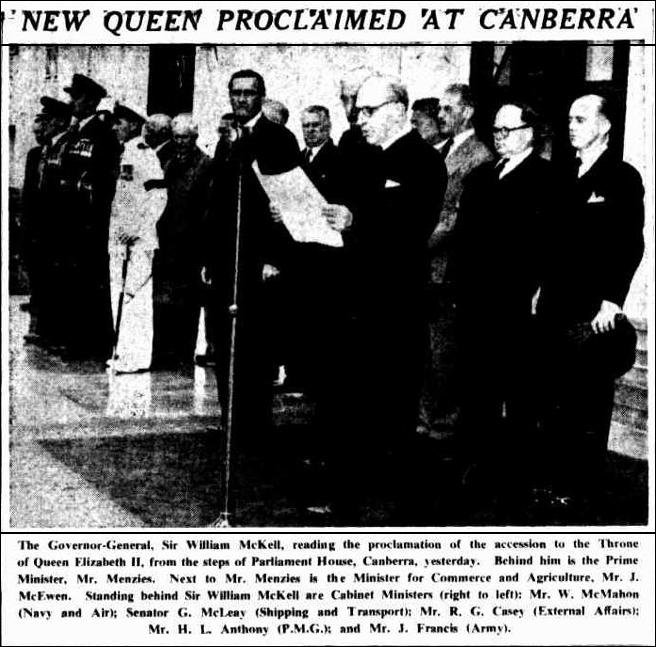On this day, 6 February 1952 at 9.50pm, Robert Menzies informs a shocked House of Representatives that their monarch King George VI had just passed away. The King had been suffering from smoking-related illnesses for some time, but the news was still surprising as it had been reported that he was on the road to recovery. On 30 January the Royal Family had gone to a musical at the Drury Lane Theatre in London to celebrate his new-found health and farewell Princess Elizabeth who was off on a Royal Tour that would include Australia. She was in a remote part of Kenya when Prince Phillip broke the news that her father had died and that she was now Queen. Cancelling the trip, she flew home immediately, and was met as she landed by Prime Minister Winston Churchill.
Australian Parliament was having an unusual February sitting at the time, the purpose of which was to deal with the highly controversial ‘soft’ peace treaty with Japan before the royal visit. The Minister for External Affairs Richard Casey was making a speech on the Bill as rumours of the King’s status spread throughout the Parliament and the Press Gallery filled. When Casey finished speaking, Menzies, who had been in a Cabinet meeting before he received a knock on the door, took the floor saying:
‘There are grievous reports, Mr. Speaker, which honourable members will have heard. I am at present not in a position to make any official statement. I suggest you adjourn the House for a few minutes and just as soon as I am able to secure confirmation or denial I will make a statement to the House.’
Many who had been busy with the business of the Chamber did not know what Menzies was referring to and were mystified, nevertheless the House was adjourned at 9.30pm. About 9.35 the telephone rang in the Prime Minister’s Room in Parliament House, with a call from the Australian Minister in London, Sir Thomas White, confirming that the King was dead.
When the bells rang summoning members back to the Chamber, the House assembled in complete silence. It was crowded with every member in Canberra in his place. The Speaker’s galleries were packed and the public galleries overflowing with many people standing at the back and trying to crowd in at the doors. Menzies walked in and immediately confirmed the rumours by his attitude. He walked straight to the table, spoke to no one, and sat with bowed head until the Speaker, Mr. A. G. Cameron, arrived to reopen the sitting. When he made his announcement Menzies spoke slowly and with deep emotion:
‘It is my very melancholy task to inform the House that news which ran in rumour a few minutes ago is now officially confirmed. His Majesty the King died this morning. I myself and I am sure every honourable member feels quite incapable at this moment of saying what should be said. I therefore propose that this House should adjourn until to-morrow when we can express our feelings as those feelings should be expressed. Meanwhile, all I need say is that the thoughts and prayers of all their subjects in this country are with the now Queen Mother and with the new Queen.’
Menzies’s voice broke and he abruptly resumed his seat. The Leader of the Opposition, Dr. H. V. Evatt, gave a reply; ‘I would add nothing to what the Prime Minister has said. It is quite impossible to transact business when hearing news of a loss which is very great and very poignant to all of us.’ After both men had finished, all commercial radio stations were invited to relay broadcasts of their speeches.
The next day the Governor-General William McKell read a proclamation from the steps of Parliament House, surrounded by Menzies and his Ministry who did not have to be re-sworn in as they had taken an oath not just to the King, but also his heirs and successors. McKell proclaimed:
‘WHEREAS it hath pleased Almighty God to call to His Mercy Our Late Sovereign Lord, King George the Sixth, of blessed and glorious memory, by whose decease the Crown is solely and rightfully come to the High and Mighty Princess Elizabeth Alexandra Mary:
We, therefore, Sir William John McKell, The Governor-General and Commander-in-Chief in and over the Commonwealth of Australia and members of the Federal Executive Council do now hereby, with one voice and consent of tongue and heart, publish and proclaim that the High and Mighty Princess Elizabeth Alexandra Mary is now, by the death of our late Sovereign of happy memory, become Queen Elizabeth the Second, by the Grace of God, Queen of this realm and of all her other Realms and Territories, Head of the Commonwealth, Defender of the Faith, Supreme Liege Lady in and over the Commonwealth of Australia, to whom her lieges do acknowledge all faith and constant obedience, with hearty and humble affection:
Beseeching God, by whom Kings and Queens do reign, to bless the Royal Princess Elizabeth the Second with long and happy years to reign over us.
Given at Canberra this seventh day of February, in the Year of our Lord One thousand nine hundred and fifty-two, and in the first year of Her Majesty’s reign.
GOD SAVE THE QUEEN!’
Further Reading:
This account relies heavily on extracts from the original reporting of the Sydney Morning Herald 7/2/1952 available at https://trove.nla.gov.au/newspaper/article/18257343?searchTerm=menzies
Newsreel footage of Australia’s reaction to the death of King George can be viewed here https://www.youtube.com/watch?v=eGYA7IKMCuY
Sign up to our newsletter
Sign up for our monthly newsletter to hear the latest news and receive information about upcoming events.


